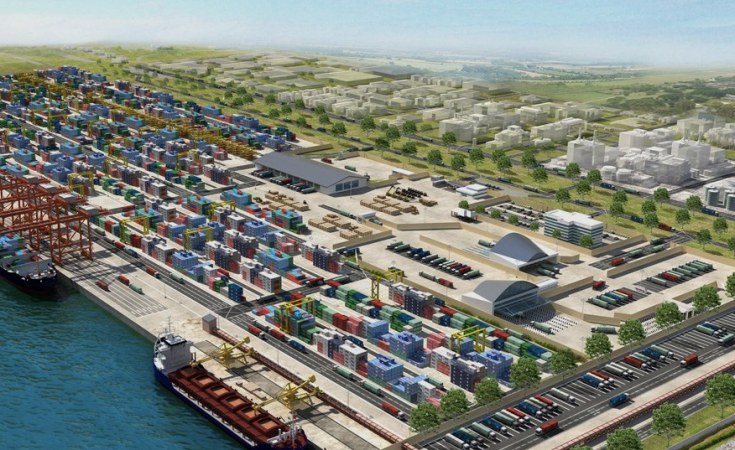Ahead of the commissioning of the Lekki Deep Seaport by President Muhammadu Buhari, today, the largest container vessel has berthed at the port.
On the official Twitter handle of the NIgerian Ports Authority (NPA), the authority, yesterday, announced the arrival of the vessel owned and operated by a Fench shipping firm, CMA/CGM.
"Ahead of President's commissioning of @LekkiPort for commercial operations tomorrow (Monday), one of the largest container vessels, the CMA-CGM, has berthed at the port.
"Once more, @NigerianPorts has proven that it is prepared to offer marine services for seamless port operations."
LEADERSHIP reports that President Buhari will officially commission the $1.5 billion Lekki Deep Seaport for commercial operations in Lagos today.
The Lekki Deep Seaport, a state-of-the-art facility that is the largest seaport and one of the biggest in West Africa, would revolutionize the way goods are transported and traded in Nigeria.tlhe
The promoters disclosed that the Lekki Port will not only improve efficiency and connectivity, but would also serve as a major driver for economic growth in the region.
LEADERSHIP gathered that the port's main breakwater is 1.5 km long with a turning circle of 600 metres, enough for a vessel up to 16,000 standard containers, and an approach channel of 11 km long.
The port has three terminals: the container terminal, the liquid terminal and the dry bulk terminal. The container terminal has an initial draft of 14 metres, with the potential for further dredging to 16.5 metres. The terminal is able to handle 2.5 million twenty-foot standard containers per year.
The deep-sea port of Lekki is the first port in Nigeria with ship-to-shore cranes. It has three of these container gantry cranes; they belong to the "Super-post-Panamax" group - this means that they can reach and unload the rearmost row of containers even if the container ship is wider than the Panama Canal (49m or 160ft maximum boat beam).
The STS cranes have a fixed rail at the quayside. They can lift 65 tonnes in twin-lift mode, 50 tonnes in single-lift mode or 85 tonnes under a hook.
The port's computerised system will allow container identification and clearance from the office, and human interaction will be minimal in the physical operations.
When the Phase 2 is completed, the deep sea port will have three liquid berths. The liquid cargo terminal will handle vessels up to 45,000 DWT (dead weight tonnage) and can expand to reach a capacity of 160,000 DWT.
Liquids (like petrol or diesel) will be handled at a tank farm near the port. The docking area is equipped with loading arms. It is also connected by pipelines along the breakwater.
The bulk terminal with available quay length of 300m can accommodate a Panamax class vessel (75,000 DWT).
The Lekki Deep Seaport made history last year as it received the first-ever vessel (Zhen Hua 28) to berth at the port.
The managing director of LPLEL, Du Ruogang, assured that after the official commissioning by President Muhammadu Buhari, the port will be fully set for the start of commercial operations.
He noted that the terminal operator, Lekki Free Port Terminal (LFT), is putting everything in place to give a world-class port experience.
Also, all the relevant agencies have been sensitised to undertake their roles in the new port.
He, however, noted that while Lagos State Government commenced work on the construction of access roads leading to the port, there was an appeal for more support in the area of infrastructural development to ensure easy cargo movement out of the port.


